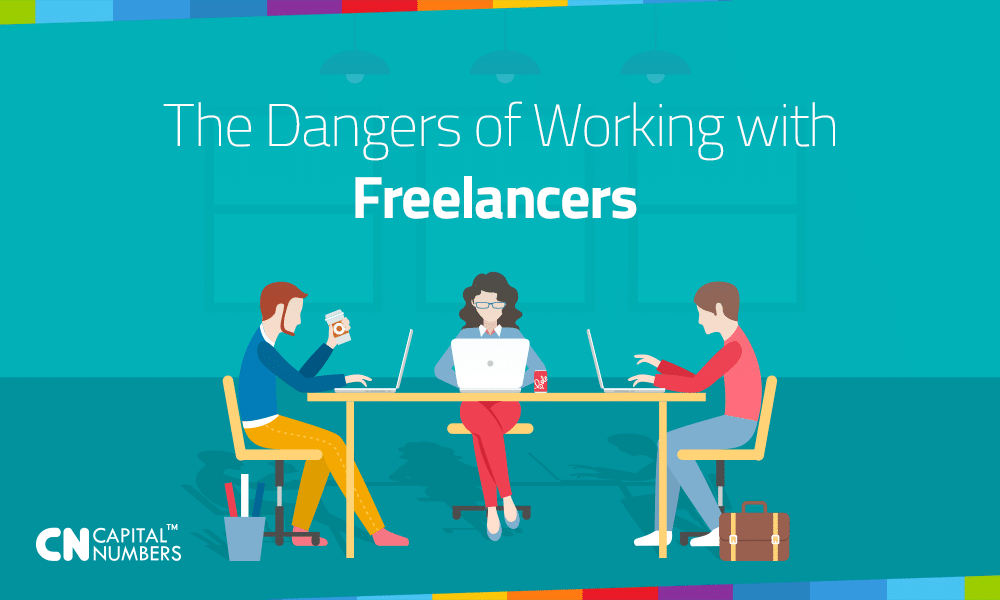The Dangers of Working with Freelancers

Freelancers have become a great option for companies that need to outsource their work temporarily when their in-house staff lacks the specific skills for the job. There are a few precautions to keep in mind, though. This is not meant to antagonize freelancers or put them in a negative light; it’s to share some of the possible adverse situations that could arise while working with them.
Freelancers should not be the lifeblood of your company
Before you even consider bringing in a freelancer to help, you need to understand the purpose of freelancing. Freelancers are not employees: they are not tied to any company and are merely offering their services on a project-by-project basis. Therefore, you shouldn’t rely on them to complete the bulk of work on your projects.
For example, if you want to create a website that displays user submitted artwork, find local employees who can do everything you need to do to achieve your initial goals. Freelancers should only need to be brought on when A) no one on your team has the required skills to finish a task or B) when everyone is too swamped with other things to work on that they can’t fit it into their schedule. By outsourcing all the integral parts of your project to people that may live in a variety of time zones, you are putting the fate of your website into the hands of the freelancers. Try to keep as much work as possible in-house to avoid complicated situations like the one aforementioned.
Multiple projects at once
The most common issue that comes with hiring freelancers is that your project most likely won’t be the only one they’re working on. Steady income for a freelancer requires them to have a constant stream of projects to work on, so keep that in mind. They may have 2 or 3 other jobs before they can give yours the proper attention it needs. With so many other things for them to work on, this can also mean that they may not finish your project by the established deadline, forcing you to either take what they have done or wait for them to finally complete it fully. Time is money and the more time you have to wait for them to finish what you ordered, you’re losing valuable customers.
Sharing your intellectual property with a stranger
Hiring remote employees requires a lot of trust on your end. You are putting your faith in someone who you’ve barely met before and hoping that they will follow the guidelines you set for them. The aspect that makes employers most nervous, though, is sharing their intellectual property with these people. Most freelancing sites have pre-screenings to make sure the people they are promoting are in good standing and reliable, but the fear that they may not handle your ideas with care can still be a deterring factor.
Inconsistent quality
Something to keep in mind while outsourcing to a freelancer is that their work is not guaranteed to be consistent from one project to another. Because they may be working on more than one project, there is a chance they may put more of their effort into another company’s job than yours. This is one of the unfortunate realities of hiring freelancers. You can’t just tell them that they need to prioritize your project because they already have enough on their plate as it is. Giving them a tight deadline won’t help you either, because even though your task immediately becomes their first priority, the quality of the work will be subpar since they didn’t have enough time to put substantial effort into it.
Could drop contact
The worst nightmare of any employer is when an employee spontaneously drops all contact. None of their calls are being answered and any frantic attempt to get in touch is returned with radio silence. Anxiety begins to set in about the uncertainty of the situation. “What happened to them and are they okay? Will I have to find someone else to complete my project? Is my IP safe?” You don’t have any need for alarm, at least not right away. Start by trying to get in contact with them and putting the pieces together before getting worked up over nothing.
The best case for this type of scenario is getting in touch with one of the freelancer’s emergency contacts. Have them give you one or more of their emergency contacts so you’ll be able to sort everything out in a timely fashion before hiring them. Hopefully you’ll be able to trace their activity and figure out what happened to them, but it’s no guarantee that you will.
Freelancing has been a valuable asset for many companies, but understand the risks before you start hiring them. Just be aware that there are some troubling possibilities when you decide to bring a freelancer in to work on your project.












